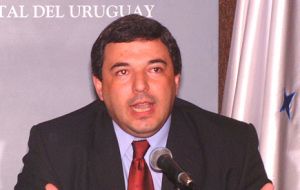MercoPress. South Atlantic News Agency
Uruguay raises basic rate to 10% to combat inflation
 Central Bank pte Mario Bergara
Central Bank pte Mario Bergara Uruguay's Central bank this week raised its reference interest rate by 2.25 percentage points to 10% in an attempt to contain inflation which last year closed at 9.19%, above government target and the highest since 2003.
"Concern with inflation exists: it's present all the time. This decision is also a clear message of our full and decisive commitment to fight inflation", said Central Bank president Mario Bergara during a meeting with the press. The Central Bank had last increased the basic reference rate in October to 7.75%. Bergara also said that the inflation target for the next 18 months remains, as had been during 2008, between 3 and 7%. "The fact that we have established a reference rate higher than our inflation target gives an undeniable signal that we are willing to adopt a monetary contractive policy if we are determined that inflation converges to the target", pointed out Bergara. According to the latest inflation expectations poll among private financial analysts released at the end of last year indicated retail prices would increased on average 7% in 2009. Inflation last year, (9.19%), according to the Central Bank, was pushed by food and housing prices. The figure, just below two digits and a relief for the government, means there will be no round of salary adjustments in 2009. This is particularly crucial for the administration of President Tabare Vazquez since presidential elections are scheduled for next October and the ruling coalition Broad Front can't agree on a consensus candidate and is also split on economic policy, which is considered far "too orthodox" and big business oriented by the militant rank and file of the coalition. Bergara insisted that the decision to raise the basic interest rate to 10% "won't have a relevant recessive impact", but political analysts in Montevideo see the move as closely influenced by the electoral year. "Tight money and fiscal laxity don't combine; it's hard to see how the government will manage to keep inflation under control with these tools", said Isaac Alfie, a former Economy minister and currently opposition Senator. . The Uruguayan economy expanded 10.5% in 2008, completing almost six years of sustained growth. However next year the Central Bank is forecasting 3%.




Top Comments
Disclaimer & comment rulesCommenting for this story is now closed.
If you have a Facebook account, become a fan and comment on our Facebook Page!